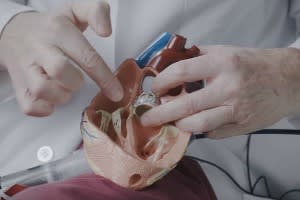What Does a Speech Therapist Do?
Published: May 04, 2021l
Speech-Language Pathology Team, Stamford Health
One of the misconceptions about speech-language pathology, or speech therapy, is that it only serves patients who have trouble speaking. Did you know that speech therapy is much more than that? (Hint: voice therapy, picky eating and swallowing skills, too!)
The speech-language pathologists at Stamford Hospital discuss what speech therapy is, how speech therapists can help children and adults, and the programs available within the rehabilitation setting below in our blog. Keep reading for the full scoop!
Speech, Language and Feeding Therapy for Kids
Pediatric speech-language pathologists treat a variety of communication, articulation and language delays and disorders that can happen during child development or as a result of genetic syndromes.
- The team at Stamford Health uses their expertise to determine the child’s current skill levels in the areas of expression, comprehension, and production of sounds and words.
- Therapists use a variety of techniques to address speech and language impairments through engaging, play-based activities designed to motivate and teach children to communicate as clearly and independently as possible.
The speech-language pathologists at Stamford Health's Tully Health Center are trained in PROMPT, a multi-sensory technique to help develop motor control for appropriate speech production. - The team is also trained in the Sequential Oral Sensory (SOS) feeding approach and can address any potential concerns for both picky eaters as well as “problem feeders.”
Speech and Language Therapy for Adults
There are several reasons why an adult may need help from a speech therapist. In most cases, major life events like traumatic brain injury, cancer, and stroke can alter the way adults produce and understand language.
Not only can these conditions affect the way an adult speaks, but they can also impact the way language is processed in the brain. Things like word-finding, pronunciation and language comprehension can become difficult as well. Tully Health Center’s speech team is trained in a variety of treatment approaches to address aphasia (a language impairment), apraxia and dysarthria (motor speech impairments) for improved communication with loved ones.
Cognitive Linguistic Therapy
The outpatient speech team at Stamford Health evaluates patients who are experiencing difficulties as a result of traumatic brain injury, concussion, or memory loss. These impairments may include:
- Memory
- Attention
- Word-finding
- Thought organization
- Reasoning
Using research-driven strategies, speech therapists help patients improve their immediate, short term and working memory skills for successful completion of daily tasks.
Speech sessions are designed to train patients to use an array of strategies to learn, process and retain new information using materials that align with individual lifestyles and interests.
Voice Therapy
Across the lifespan, voices can change as a result of illness, disease, or even misuse, like talking too much or too loudly. This can make communication difficult.
Stamford Health's outpatient rehab speech-language pathologists work with patients to improve the quality, loudness and pitch of their voices. Contributing factors to voice problems can include:
- Vocal cord nodules
- Vocal fold paralysis/weakness
- Irritation caused by acid reflux
The speech department at Stamford Health's Tully Health Center assesses a patient’s voice using instrumental measurements and determines the best course of action to improve vocal hygiene and vocal quality. In addition, the speech therapists are all certified LSVT LOUD clinicians, a specialized research-based treatment approach to improving loudness and speech clarity in patients with Parkinson’s disease.
Swallowing Therapy
Many factors can influence the way we bite, chew and swallow food including neurological impairment, stroke, or even normal aging. Difficulty swallowing can have a significant impact on health, safety and quality of life. The speech therapists at Stamford Health can clinically assess a patient’s swallow safety and function.
Evidence-based research guides the tools and exercises the team uses to strengthen the muscles involved in swallowing and help make eating as safe and enjoyable as possible for patients and their loved ones.
Outpatient Modified Barium Swallow Studies
Our team may use a method called modified barium swallow studies, done in the radiology department at Stamford Hospital, to assess swallow function in some individuals. Modified barium swallow studies use real-time x-rays to observe how someone swallows.
During the exam, the patient is given a food or a liquid that is coated in a contrast material (barium sulfate). The test provides information about the overall swallowing process, both motor and sensory aspects, as well as the risk for fluids or foods going into the lungs, know as aspiration.
Results from this test will allow the speech-language pathologist to make recommendations for the safest and most effective diet and liquid consistencies, and may offer strategies to improve swallow function or safety.
Please discuss having a modified barium swallow study with your doctor if you or someone you care has any of the following symptoms: coughing while eating or drinking, wet/gurgly voice after meals, the sensation of food getting stuck in the throat, increased effort or number of swallows to clear food, or any other swallow-related concerns.
About Outpatient Speech Therapy Services at Stamford Health
The Speech Therapy Department at Stamford Health’s Tully Health Center provides outpatient rehabilitation services for a variety of communication and swallowing needs across the lifespan. Combining evidence-based treatment approaches with clinical expertise and patient beliefs and values, the speech-language pathologists create comprehensive plans of care tailored to everyone’s needs and skill levels.
Featured Expert/ Author































































